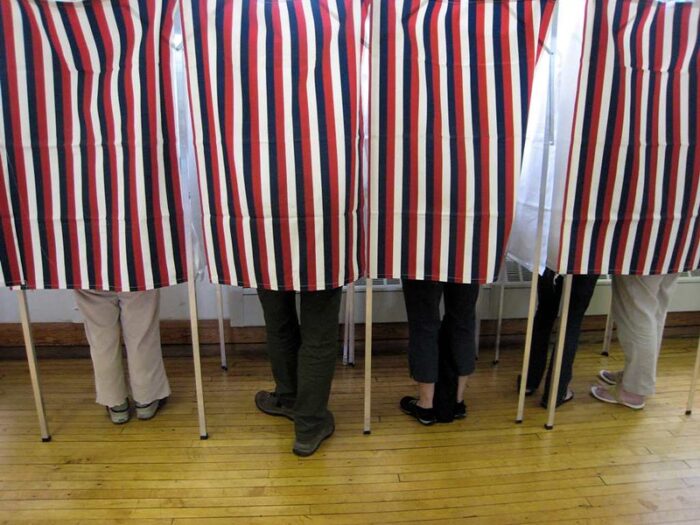
Endorsements for politicians have a long history in U.S. newspapers, which until the 20th century were usually explicitly aligned with one political party or faction. Traditionally, endorsements have fallen under the purview of a newspaper’s owner or its editorial board. Journalists may know the decision of which candidate to endorse is distinct from the newsroom’s reporting, but many readers don’t separate the two.
As we recently found, in a study published in Journalism and Mass Communication Quarterly, many journalists themselves have come to see editorial endorsements as a liability. In 2020, we interviewed 64 political journalists with affiliations ranging from digital-only news outlets to national magazines to local and national newspapers. Most of the journalists we interviewed didn’t question their newsrooms’ ability to uphold the metaphorical wall between the editorial and reporting sides, with one reporter referring to it as “a pretty strict firewall.”
However, they also felt the need to explain to readers the divide between an endorsement from a newspaper’s editorial board and the newspaper’s other journalists. Some reporters told us that sources had asked them why they’d endorsed the other candidate. The journalists would find themselves clarifying that they hadn’t endorsed anyone — their editorial board had. As one journalist put it: “Nobody knows the distinction between the editorial board and the reporters, and that’s our fault for not telling them. Every four years we shoot ourselves in the foot.” Another noted: “Political parties like to bash some news organizations, leading to viewers believing a news organization is biased.” Endorsements, he added, “can exacerbate those preconceived notions.”
The journalists in our study largely found the practice of political endorsements to be somewhat archaic. Eight of those we spoke to defended endorsements, but even in those cases it was conditional — for example, one journalist argued the practice should exist only on a community level. Even supporters of the idea of endorsements felt that the practice exacerbated the already hard work of political journalism, complicated by growing political polarization and audience mistrust.
“Readers pay little attention to that distinction mark between opinion and non-opinion,” a journalist told us. “It contributes to the public’s view that publications have an agenda.”
Notably, when delineating the separation between the newsroom’s editorial board and news desk, journalists did so not only metaphorically — by evoking the imagery of a wall separating the two — but also grammatically, through the pronouns they used in explaining their newsroom’s practices to us. Journalists who worked in newsrooms that did offer endorsements used the term “they” to denote the editorial board and to emphasize their own separation from the endorsement process. In contrast, when journalists were in newsrooms that not offer endorsements, they often used the term “we” in describing the practice (e.g., “we don’t do that”), a rhetorical move signaling they embraced and internalized this position. One journalist said they had actually left their newsroom because it offered editorial endorsements.
Beyond issues of wellbeing and audience concern, the journalists we interviewed also indicated that endorsements aren’t particularly effective. In the words of one journalist, endorsements are likely to “affect the public’s perception of newspapers more than their perception of candidates.”
Some papers have already changed their policies. In the run-up to the 2020 U.S. election, McClatchy announced that the papers in its chain wouldn’t make presidential endorsements unless they’d individually interviewed both candidates. The Dallas Morning News made a similar decision to endorse neither candidate in 2020, after receiving blowback in 2016.
The journalists we interviewed found editorial endorsements to be most valuable in local races. The kinds of relationships local newspapers cultivate with readers, they said, are different from relationships with national newspapers. Local newspapers also enjoy higher levels of trust with readers than national papers do. This might make it more likely that the public will perceive editorial endorsements as an example of newspapers delivering on their promise to inform the public, rather than as examples of media bias.
In contrast to state and federal contests, journalists argued, in local elections, such as city council or mayoral races, contenders often run as nonpartisan candidates, which may make it less likely that the public will look at editorial endorsements through a partisan lens. A few pointed out that in local elections— which often end up overshadowed by the news coverage of national races — robust information about candidates is often lacking. This, again, could justify newspapers’ decisions to issue editorial endorsements as part of their service to the public.
But, based on our research, it’s worth considering whether news outlets’ endorsements are a tradition that continues to serve the public.
“The public cannot tell the difference,” one journalist told us. “When they hear ‘The New York Times’ editorial endorsed Elizabeth Warren,’ for example1, it trickles down on the journalist.”
Gregory P. Perreault is an associate professor of journalism at Appalachian State University. Volha Kananovich is an assistant professor of digital journalism at Appalachian State University.